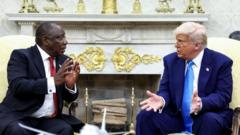Rob Hoatson clarifies that the white crosses depicted by Trump were not graves, but a temporary memorial for a couple murdered on their farm. The discussion highlights the ongoing tensions surrounding agricultural crime in South Africa and the intricacies of international perceptions.
Trump Mislabels Memorial in South Africa as Burial Site, Organizer Responds

Trump Mislabels Memorial in South Africa as Burial Site, Organizer Responds
Miscommunication over white crosses display stirs international dialogue on farming violence in South Africa.
The man who organized a notable display of white crosses along a roadside in South Africa responded to Donald Trump's mischaracterization of it as a "burial site." Rob Hoatson, the organizer of the memorial, stated that the crosses were erected in KwaZulu-Natal province to honor Glen and Vida Rafferty, who were tragically killed on their farm in 2020.
During an intense conversation at the White House, Trump presented a video of the memorial to South African President Cyril Ramaphosa, suggesting that it illustrated a trend of violence against white farmers in the country. While acknowledging that violence exists, Ramaphosa countered Trump's assertions by emphasizing that the Afrikaner community is not facing systematic extermination. "These are burial sites… over 1,000 of white farmers," Trump claimed in the Oval Office, discussing the crosses as if they were grave markers.
Hoatson, a 46-year-old farmer, explained that while he did not object to Trump using the images without consent, he felt it necessary to correct any misconceptions. "It's not a burial site, but it was a memorial," he asserted, emphasizing that it was a temporary homage to the deceased couple, who were his neighbors. The memorial, which featured over 2,500 white crosses, has since been dismantled.
In a follow-up conversation with the BBC, Hoatson took the opportunity to address the broader issue of violence against farmers, labeling the murders as "unacceptable" and "unnecessary." When assessing Trump's performance during the meeting, he stated, “I think Trump placed the facts… at the foot of Ramaphosa and asked him to respond to them,” noting that Ramaphosa's dismissal of the concern felt inadequate.
Ultimately, Ramaphosa acknowledged crime in South Africa while highlighting that the majority of fatal incidents overwhelmingly affect black citizens. Although the nation does not publish race-based crime statistics, reports indicate that nearly 10,000 murders occurred in the country from October to December of 2024, with only a small fraction arising from farm attacks.
Various Afrikaner activists praised Trump's comments as they brought attention to the challenges faced by farmers in South Africa, yet political figures, including columnist Pieter du Toit, regarded it as a consequence of ongoing exaggeration and misinformation. The dynamic between South Africa and the U.S. continues to spark discussions around agricultural safety, racial tensions, and the role of international perspectives.



















